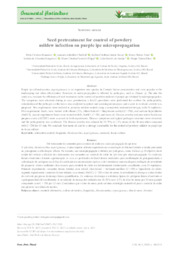Seed pretreatment for control of powdery mildew infection on purple ipe micropropagation.
Seed pretreatment for control of powdery mildew infection on purple ipe micropropagation.
Author(s): MAMEDES, T. C.; CHAIBUB, A. A.; SOUSA, K. C. I.; FARIA, M. T.; GONÇALVES, L. de A.; FILIPPI, M. C. C. de; ARAÚJO, L. G. de; SIBOV, S. T.
Summary: Purple ipe (Handroanthus impetiginosus) is an important tree species in Cerrado biome conservation and very popular at the landscaping and urban afforestation. However, its micropropagation is affected by pathogens, such as Oidium sp. The aim this study was evaluate the efficiency of seed treatments in the control of powdery mildew of purple ipe obtained by micropropagation. The symptoms were observed during in vitro germination, a Koch?s postulates were performed for confirm the pathogenicity, colonization of the pathogen on the leaves was analyzed in optical and scanning microscopes and a scale to evaluate severity was proposed. Two experiments were realized to powdery mildew control using a completely randomized design, with 30 replicates. First experiment: Seeds were treated with ethanol (Et), chlorothalonil + thiophanate-methyl (C+TM), and sodium hypochlorite (NaOCl); second experiment: Seeds were treated with Et, NaOCl, C+TM, and neem oil. Disease severity and area under the disease progress curve (AUDPC) were assessed in both experiments. Disease symptoms and typical pathogen structures were observed, and the pathogenicity was confirmed. The disease severity was reduced by 30.78% in 1.5% neem oil for 10 min when compared with C+TM for 15 min. We conclude that neem oil can be a strategy sustainable for the control of powdery mildew in purple ipe in tissue culture.
Publication year: 2022
Types of publication: Journal article
Unit: Embrapa Rice & Beans
Observation
Some of Embrapa's publications are published as ePub files. To read them, use or download one of the following free software options to your computer or mobile device. Android: Google Play Books; IOS: iBooks; Windows and Linux: Calibre.
Access other publications
Access the Agricultural Research Database (BDPA) to consult Embrapa's full library collection and records.
Visit Embrapa Bookstore to purchase books and other publications sold by Embrapa.

